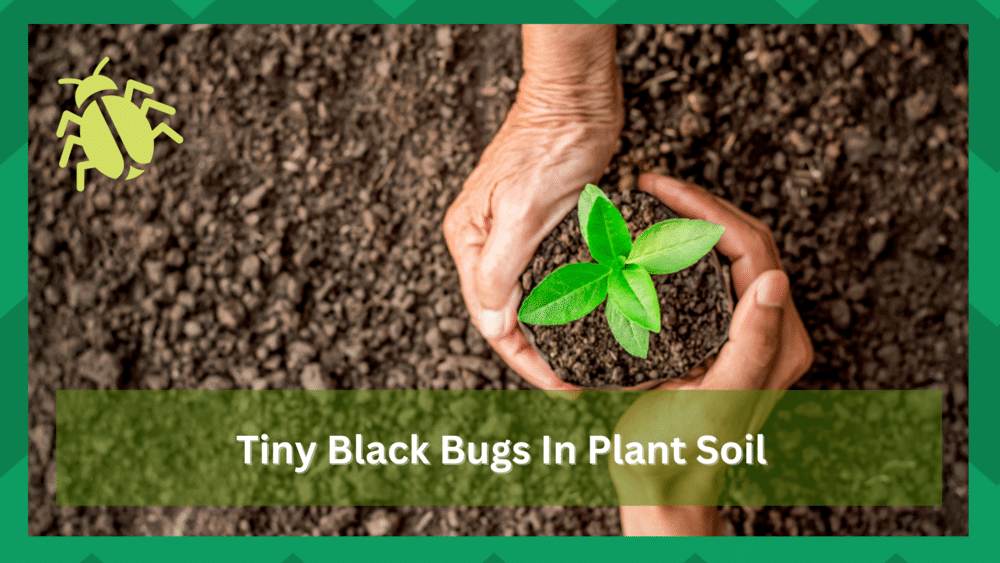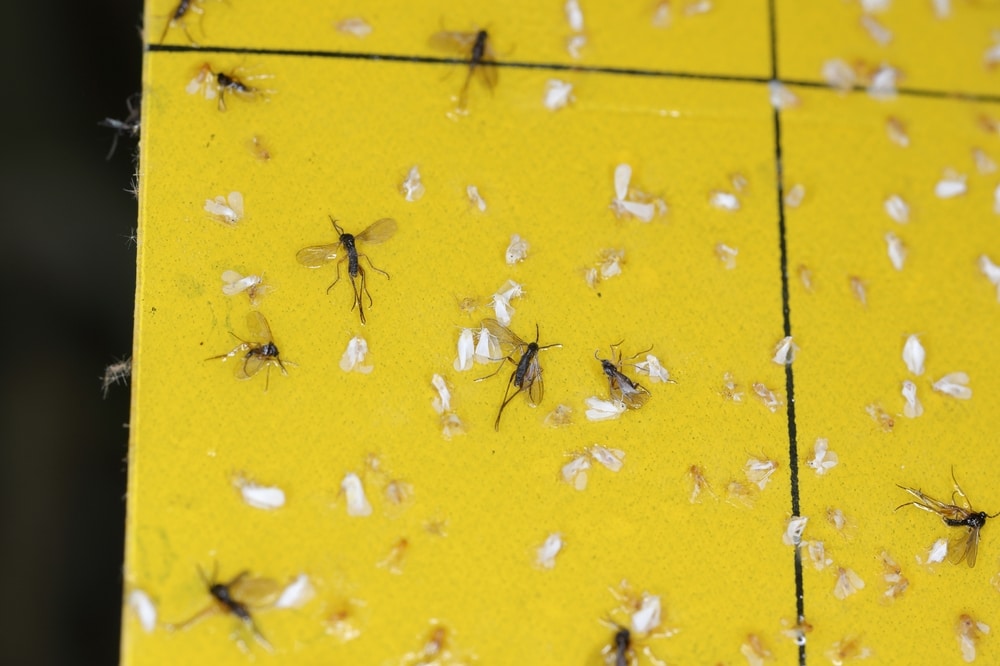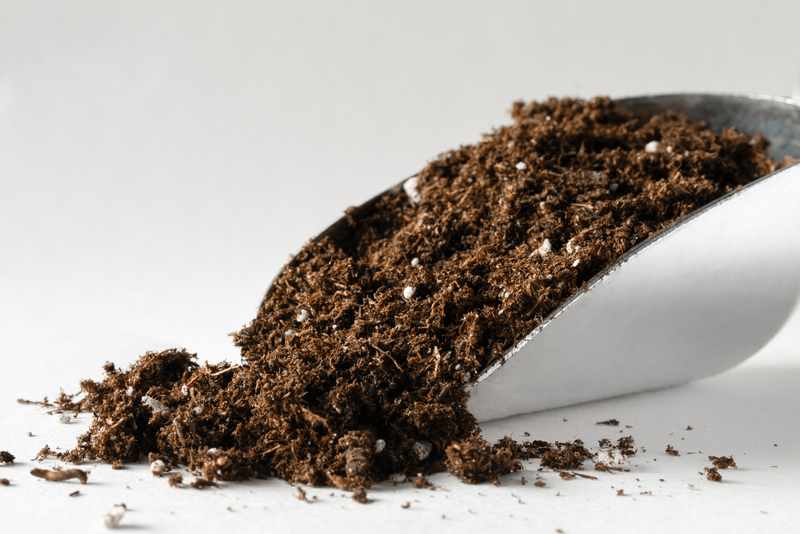
To ensure the good growth of plants in the soil, there are many crucial factors that you will need to keep in check. For instance, you will have to ensure the plants are placed in a place with good light levels. You will also have to water the plants regularly.
Alongside these things, one other thing that you will need to keep an eye on is that no harm is done to the plants or the soil itself. Pests and bugs destroy the growth of your plants if not taken care of.
How To Get Rid Of Tiny Black Bugs In Plant Soil?
If you have seen tiny black bugs in your soil, they are probably fungus or soil gnats. These are some of the most common pests that can be found in houseplants.
As a result, there is no need to get worried if you find some in your soil. However, you will have to get rid of them as they are annoying little pests that can damage the roots of your plants.
Today, we will explain how you can easily eliminate these tiny black bugs in your plant soil. Here’s what you will need to do:
Getting Rid of Fungus Gnats in Houseplant Soil
If you already have many fungus gnats in the plants, it may be difficult to get rid of them. The reason is that they can easily either fly or jump from one plant to the other. They also lay eggs whenever they find moist soil.
However, it is important to note that adult fungus gnats have a life span of just a few days. This means that you will only have to deal with the larvae. Once these are dead, your bug problem will go away.
- Control Soil Moisture in Your Plants
A key point about these bugs is that they cannot survive on dry soil. Hence, the easiest and most effective method of getting rid of these bugs is simply controlling the moisture. All you have to do is ensure you do not overwater the soil.
Also, these bugs only seem to live on the top side of the plant. Another good practice would be to only water the bottom of the soil, leaving the top dry.
- Use a Sticky Trap
Tiny black bugs in your houseplant soil can be a big nuisance. These small, dark-colored insects are likely fungus gnats, which feed on plant roots and decaying organic matter in the soil.
Fungus gnats can cause serious damage to young plants, so it’s important to take steps to get rid of them as soon as possible.
One effective way to control these pests is by using sticky traps. Here’s how you can use sticky traps to get rid of tiny black bugs in your plant soil:
Step 1: Buy sticky traps from a garden supply store, or make them yourself by cutting out small rectangles of yellow paper and coating them in petroleum jelly.
Step 2: Place the traps around the soil surface of your plants. Make sure to place several near the edges of pots where fungus gnats are most likely to enter.
Step 3: Check the traps periodically to see if any bugs have been trapped. If you find any, discard them in an outdoor trash can or compost bin.
Step 4: Replace the traps with fresh ones until your tiny black bug problem has been eliminated.
Using sticky traps is a simple and effective way to eliminate tiny black bugs in your plant soil. Be sure to check the traps regularly and dispose of any captured pests promptly to reduce the chances of an infestation getting out of control.
If you still have a problem with fungus gnats after trying sticky traps, it may be time to seek professional help from a pest control specialist.
- Remove the Infested Soil
One more thing that we recommend you do is to remove and replace the top inch of your soil. Make sure that you replace the soil with new sterile soil.
Doing so should help you eliminate both gnat eggs and larvae. Ensure to throw the soil you remove directly into the trash, as the eggs can still hatch.
How to prevent Tiny Black Bugs In Plant Soil?
Tiny black bugs in plant soil can be a nuisance, and it’s important to take steps to eliminate them.
These small insects feed on the roots of plants, causing damage that can lead to wilting leaves or even death. Fortunately, there are several ways you can prevent tiny black bugs from infesting your plants’ soil.
One way is to keep the area around your plants clean and free of debris like fallen leaves or twigs that could provide shelter for these pests.
You should also ensure adequate drainage in your pots so water doesn’t pool and create standing water that attracts these insects.
If you notice any signs of infestation, such as small holes in the soil or an increase in ants around the pot, you should remove all affected soil immediately and replace it with a fresh potting mix.
Avoid using chemical pesticides since they may kill beneficial organisms like earthworms which help aerate the soil and promote healthy plant growth. Instead, opt for natural remedies such as neem oil which has insecticidal properties but is less toxic than traditional pesticides.
Next, inspect any new plants before you bring them home, and avoid bringing in soil from outdoor areas since it may contain insects or pathogens that could harm your indoor plants.
If you notice any bugs on the surface of your soil, try using a vacuum cleaner to remove them quickly and safely.
By following these steps, you can help prevent tiny black bugs from causing damage to your plants. Not only will this keep your plants healthy and thriving, but it will also save you money, as pest control treatments can be expensive.
If the infestation is too severe, it’s best to consult a professional for help.
What to do once tiny black bugs have developed in plant soil?
When black bugs start to develop in the soil of your plants, it’s important to take action as soon as possible. These bugs are usually fungus gnats, which can cause damage to the plant’s roots and leaves. Fortunately, you can take steps to get rid of them before they do too much damage.
The first step is ensuring the soil is well-drained and not overly wet or moist. Fungus gnats thrive in damp conditions, so drying out the soil will help reduce their numbers significantly.
You should also ensure that any containers with drainage holes have a layer of gravel at the bottom, so excess water doesn’t accumulate around the roots of plants.
Next, consider introducing beneficial nematodes into your garden or houseplant pots. This type of natural pest control helps keep pesky insects away without using harmful chemicals that could damage your plants and environment.
Home remedies like neem oil sprays or diatomaceous earth can be used on affected areas to disrupt fungus gnat larvae development cycles and discourage them from returning again in future seasons!
It’s important to monitor the plants for any signs of infestation and take immediate action if you spot black bugs.
Regularly cleaning up debris and dead leaves from around your plants is another effective way of controlling fungus gnats, as these can provide a source of food for them. With effort and preventive measures, you can keep these bugs away from your plants!
It’s also a good idea to use sticky traps or other insecticides to trap and kill adult gnats. Sticky traps are especially effective because they don’t contaminate the soil and won’t harm beneficial insects like pollinators.
Insecticides can also be used but should only be used as a last resort since they can adversely affect other insects and the environment.
By following these tips, you can easily get rid of black bugs from your plants and keep them away for good. Just remember to take preventive measures like proper drainage and regular clean-up to avoid infestations from happening in the future.
With some effort, you’ll have your garden or houseplants looking and feeling great in no time.
Concluding Thoughts
In conclusion, tiny black bugs can cause significant damage to your plants if left unchecked. Fortunately, there are several steps you can take to get rid of these pests and keep them away for good.
From introducing beneficial nematodes into the soil to using natural remedies like neem oil sprays or diatomaceous earth, there are plenty of ways to protect your plants from infestation without resorting to harsh chemicals.
Regular clean-up and proper drainage will help prevent any future problems with fungus gnats. With a bit of effort and preventive measures in place, you’ll be able to keep your garden or houseplants looking healthy and vibrant!



